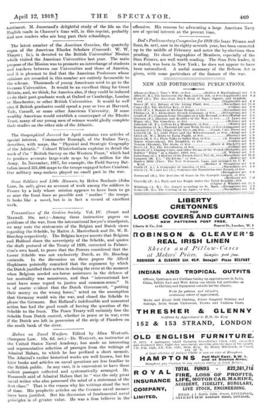Transactions of the Groans Society. Vol. IV. (Sa - eet and Maxwell.
10s. net.)—Among these instructive papers on problems of the war, from the international lawyer's standpoint, we may note the statements of the Belgian and Dutch views regarding the Schelde, by Maitre A. Maeterlinck and Dr. W. R. Bisschop respectively. The Belgian lawyer asserts that Belgium and Holland share the sovereignty of the Schelde, and quotes the draft protocol of the Treaty of 1839, corrected in Palmer- ston's own hand, to prove that the Powers considered that the Lower Schelde was not exclusively Dutch, as Dr. Bisschop contends. In the discussion on these papers Sir Alfred Hopkinson pointedly remarked that the argument by which the Dutch justified their action in closing the river at the moment when Belgium needed sea-borne assistance in the defence of her neutrality was monstrous, and that " international law must have some regard to justice and common-sense." It is of course evident that the Dutch Government, " putting their money on the wrong horse," acted on the assumption that Germany would win the war, and closed the Schelde to please the Germans. But Holland's indefensible and unneutral action has had the good result of forcing the question of the Schelde to the front. The Peace Treaty will certainly free the Schelde from Dutch control, whether in peace or in war, even if the Dutch are left in possession of the strip of Flanders on the south bank of the river.



































 Previous page
Previous page